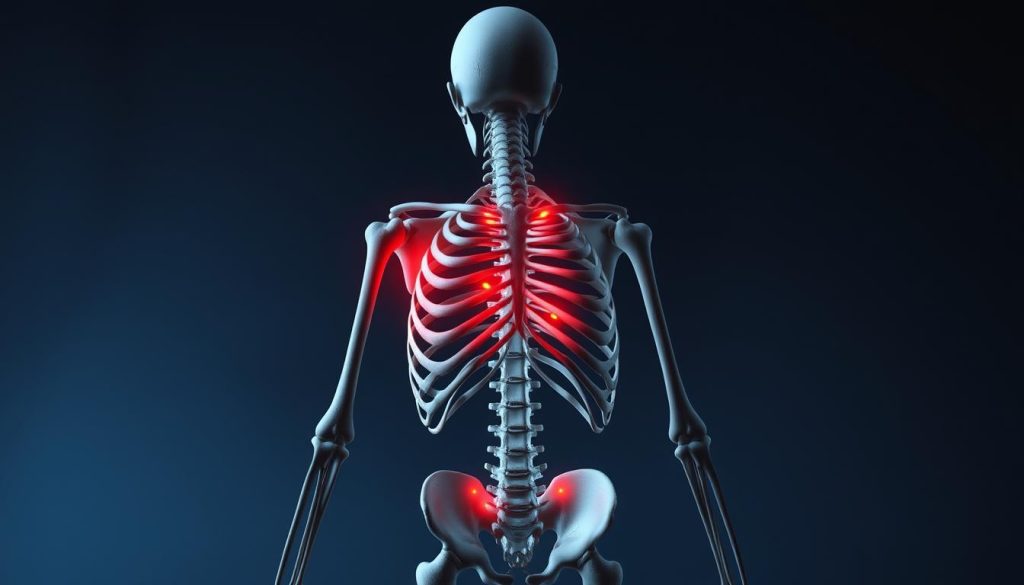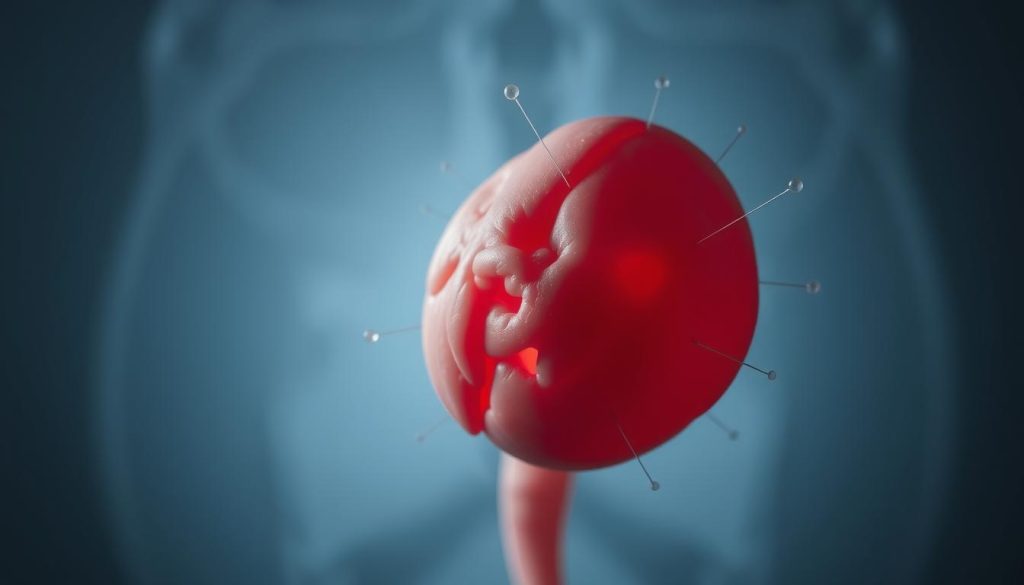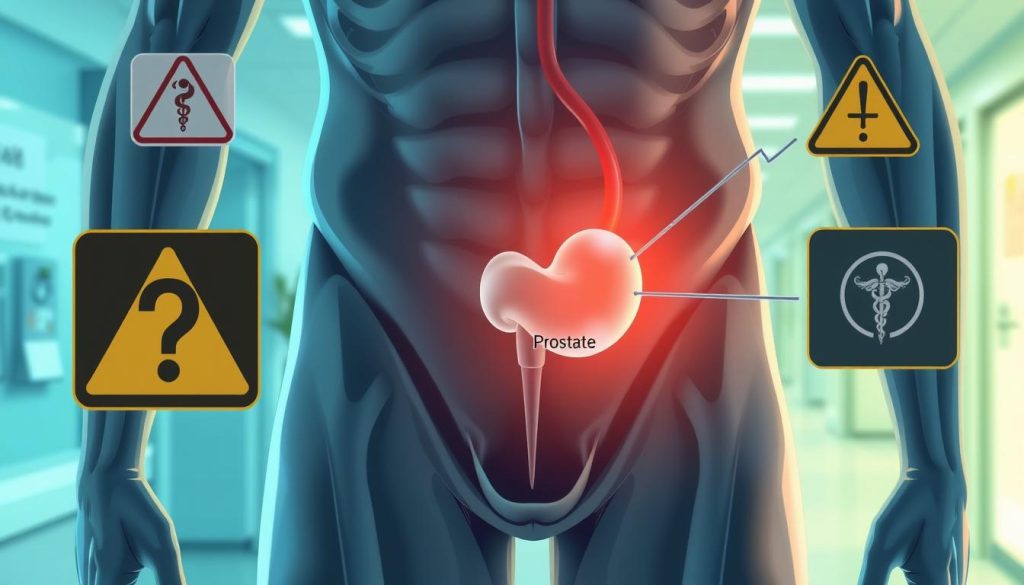Prostate cancer is a serious issue for men. It often grows quietly. Knowing the early signs is key to catching it early. This guide will help you understand the symptoms, keeping you safe.
Some men might not feel anything in the early stages. Others might notice small changes. These can include trouble with urination or feeling uncomfortable. Spotting these signs early can help a lot.
Every man’s experience with prostate cancer is different. It’s important to stay alert about your health. If you have any worries, talk to your doctor right away.
What Is The Symptoms Prostate Cancer And Initial Warning Signs
Prostate cancer often grows quietly, making it key to know its early signs. Men should watch for prostate tumor and enlarged prostate symptoms. Spotting these signs early can lead to better treatment outcomes.
Understanding Prostate Cancer Development
Prostate cancer starts when cells in the prostate gland grow too much. This can take years before symptoms show up. As the tumor grows, it may press on the urethra, causing urinary problems.
Risk Factors And Age-Related Concerns
Age is a big factor in prostate cancer risk. Men over 50 face a higher risk. Other factors include family history, race, and diet. Talking to a doctor about these can help set up the right screening schedule.
| Age Group | Risk Level | Recommended Screening |
|---|---|---|
| Under 40 | Low | Not typically recommended |
| 40-50 | Moderate | Consider if high risk |
| 50+ | High | Regular screening advised |
Common Early Warning Indicators
Early prostate cancer might not show symptoms. When they do, they can look like enlarged prostate symptoms. Signs include needing to urinate often, weak urine flow, and trouble starting or stopping urination. Blood in urine or semen is a serious sign that needs quick medical attention.
- Frequent urination, especially at night
- Weak or interrupted urine flow
- Difficulty starting or stopping urination
- Blood in urine or semen
- Painful or burning sensation during urination
Knowing these symptoms can help men stay proactive about their health. Regular check-ups and talking openly with doctors are crucial for early detection and treatment of prostate cancer.
Urinary Changes And Related Symptoms
Prostate cancer often shows up through urinary symptoms. Spotting these signs early can help get the right treatment sooner. Let’s look at the main urinary symptoms prostate cancer patients might face.
Frequent Urination Patterns
Men with prostate cancer might find themselves going to the bathroom more often. This can happen especially at night. It can mess up your sleep and daily life. If you’re always rushing to the bathroom, talk to your doctor about it.
Difficulty Starting Or Stopping Urination
Prostate enlargement can make it hard to start or stop urinating. You might struggle to start or feel like you’re not fully emptying your bladder. These symptoms of prostate cancer are important to pay attention to.
Blood In Urine Or Semen
Blood in urine or semen is a serious sign. It doesn’t always mean cancer, but it needs quick medical attention. Finding these symptoms early is key for good treatment.
Weak Urine Stream Issues
A weak urine stream is another common sign. You might notice your stream is weaker or interrupted. This symptom can get worse over time, making it harder to empty your bladder fully.
| Urinary Symptom | Description | Action Required |
|---|---|---|
| Frequent Urination | Increased bathroom visits, especially at night | Monitor and report to doctor |
| Difficulty Urinating | Problems starting or stopping urine flow | Seek medical evaluation |
| Blood in Urine/Semen | Visible blood in urine or semen | Immediate medical attention |
| Weak Urine Stream | Decreased force or interruptions in urine flow | Consult urologist |
Physical Discomfort And Pain Symptoms
Prostate cancer can cause physical discomfort in different parts of the body. Pain is usually a late sign, but it’s important to notice any warning signs. If you have ongoing or unexplained pain, see a doctor right away.
Pelvic discomfort is a common sign. Some men feel a dull ache or pressure in their lower abdomen or groin. This feeling can get worse when sitting for a long time or during certain activities.
Back pain, especially in the lower back, can be a sign of advanced prostate cancer. If cancer spreads to the spine, it might cause ongoing discomfort or stiffness. Hip pain is also a potential sign, especially if it’s paired with other symptoms.
“Pain that doesn’t go away and can’t be explained by other causes should always be evaluated by a healthcare professional.”
In some cases, men may feel pain or discomfort when urinating or ejaculating. While these symptoms can have many causes, they need medical attention, especially if they don’t go away or get worse.
| Pain Location | Possible Indication | When to Seek Help |
|---|---|---|
| Pelvic Area | Prostate enlargement or tumor | Persistent discomfort for weeks |
| Lower Back | Potential metastasis to spine | Ongoing pain with no apparent cause |
| Hip | Possible bone metastasis | Unexplained pain lasting over a month |
| During Urination | Prostate issues or infection | Pain persists beyond a few days |
Remember, these symptoms don’t always mean you have prostate cancer. Many conditions can cause similar discomfort. But, if you have persistent pain or any concerning symptoms, it’s crucial to get a medical check-up for the right diagnosis and care.
Advanced Stage Prostate Cancer Indicators
Prostate cancer can get worse and cause more severe symptoms. It’s important to know the signs of advanced prostate cancer. This helps in getting the right treatment early.
Bone Pain and Metastasis Signs
Prostate cancer often spreads to the bones, causing pain. This pain usually hits the hips, back, and pelvis. People say it feels like a deep ache that gets worse over time.

Weight Loss and Fatigue
Weight loss and feeling very tired are common signs. Patients often see a big drop in appetite and energy. This makes it hard to do everyday things.
Lymph Node Swelling
Cancer can make lymph nodes swell, especially in the groin. This swelling might not hurt but is easy to feel.
Sexual Function Changes
Advanced prostate cancer can mess with sex life. Men might find it hard to get or keep an erection. They might also feel less interested in sex.
| Symptom | Description | Frequency |
|---|---|---|
| Bone Pain | Deep ache in hips, back, pelvis | Common |
| Weight Loss | Unexplained decrease in body weight | Frequent |
| Fatigue | Persistent tiredness, lack of energy | Very Common |
| Lymph Node Swelling | Enlarged nodes, especially in groin | Less Common |
| Sexual Dysfunction | Erectile issues, decreased libido | Common |
If you notice any of these symptoms, see your doctor right away. Early treatment can make a big difference in how you feel and live.
Diagnostic Tests And Screening Methods
Finding prostate cancer early is key to treating it well. Doctors use several tests to screen and diagnose this disease. Let’s look at the main ways to spot prostate cancer.
The prostate-specific antigen (PSA) test is a main screening tool. It checks PSA levels in your blood. High levels might mean cancer, but other things can also affect PSA. Your doctor will look at these results with your age and health history in mind.
Digital rectal exams (DRE) are also key. A doctor feels your prostate gland for any oddities. DRE can find lumps or irregularities that might point to cancer.
If tests suggest cancer, your doctor might suggest a prostate biopsy. This involves taking small tissue samples from your prostate. The biopsy results will tell if there are cancer cells and how aggressive they are.
| Diagnostic Test | Purpose | What It Involves |
|---|---|---|
| PSA Test | Measures prostate-specific antigen levels | Blood draw |
| Digital Rectal Exam | Physical examination of prostate | Manual exam by doctor |
| Prostate Biopsy | Collects tissue samples for analysis | Needle extraction of prostate cells |
These tests help give a full picture of your prostate health. Your doctor will use the results to decide if more action is needed. Remember, finding cancer early can greatly improve treatment chances.
When To Seek Medical Attention
It’s important to catch early signs of prostate cancer. If you notice changes in how you pee or feel pain, see a doctor. These could be signs of prostate cancer.

Men over 50 should get regular check-ups. African American men and those with a family history should start at 45. Talk openly about your symptoms and worries with your doctor. This helps them figure out your risk and what tests you need.
- Frequent urination, especially at night
- Difficulty starting or stopping urination
- Weak urine stream
- Blood in urine or semen
- Unexplained pain in the lower back, hips, or pelvis
If you have these symptoms, make an appointment with your doctor. Early detection is key to better treatment. Don’t be scared or embarrassed to get checked.
“Early detection saves lives. Never hesitate to discuss your prostate health with a medical professional.”
Your doctor might suggest a PSA test or a DRE. These tests can find problems early, before you notice symptoms. Regular check-ups are crucial for your health.
Coping With A Prostate Cancer Diagnosis
Getting a prostate cancer diagnosis can feel overwhelming. You might feel scared, angry, or many other emotions. But, you’re not alone. Talking to your healthcare team and looking at trusted resources can help you understand your options.
Learning how to cope can make your life better. It can give you hope and comfort during tough times.
When dealing with prostate cancer, joining support groups can be helpful. These groups let you share your story and learn from others. It’s important to talk openly with your doctor about any changes, like sexual function issues.
Staying positive and finding ways to relax, like meditation, can help. Keep your medical records in order and talk to your family about your care. Genetic counseling might be good for some families, especially if cancer runs in your family. Remember, everyone’s experience with prostate cancer is different. Take things one step at a time.
FAQ
Q: What are the most common early warning signs of prostate cancer?
A: Signs of prostate cancer include frequent urination, especially at night. You might also have trouble starting or stopping urination. A weak urine stream and blood in urine or semen are other signs. But, these symptoms can also mean non-cancerous conditions like BPH.
Q: At what age should men start getting screened for prostate cancer?
A: Men should talk to their doctor about screening at age 50 if they’re at average risk. African American men and those with a family history of prostate cancer should talk about screening earlier, around age 45.
Q: How is prostate cancer diagnosed?
A: Doctors use a PSA blood test, digital rectal exam (DRE), and sometimes a biopsy to diagnose prostate cancer. Imaging tests like MRI might also be used to guide the biopsy or check if the cancer has spread.
Q: Can prostate cancer cause back pain?
A: Yes, advanced prostate cancer can cause back pain if it spreads to the bones. But, back pain can have many causes and doesn’t always mean prostate cancer.
Q: How does prostate cancer affect sexual function?
A: Early prostate cancer might not affect sexual function. But, treatments like surgery or radiation can lead to erectile dysfunction. It’s important to talk about these possible side effects with your doctor.
Q: What does an elevated PSA level mean?
A: A high PSA level might mean prostate cancer, but it’s not sure. Other conditions like prostatitis or BPH can also raise PSA levels. If your PSA is high, your doctor will want to do more tests to find out why.
Q: Are there any lifestyle changes that can reduce the risk of prostate cancer?
A: While you can’t prevent prostate cancer, some lifestyle changes might help. Stay healthy, exercise, eat lots of fruits and veggies, and limit red meat and high-fat dairy.
Q: How quickly does prostate cancer typically progress?
A: Prostate cancer often grows slowly, especially in older men. Some cases might not need immediate treatment and can be watched closely. But, some prostate cancers can grow fast. Regular check-ups and talks with your doctor are key to tracking any changes.
Q: What are the treatment options for prostate cancer?
A: Treatment choices depend on the cancer stage, your health, and what you prefer. Options include active surveillance, surgery, radiation, hormone therapy, and sometimes chemotherapy or immunotherapy.
Q: Can prostate cancer be cured if caught early?
A: Early detection of prostate cancer has a high cure rate. Localized cancer can often be treated successfully with surgery or radiation. The 5-year survival rate for localized or regional prostate cancer is nearly 100%.


















